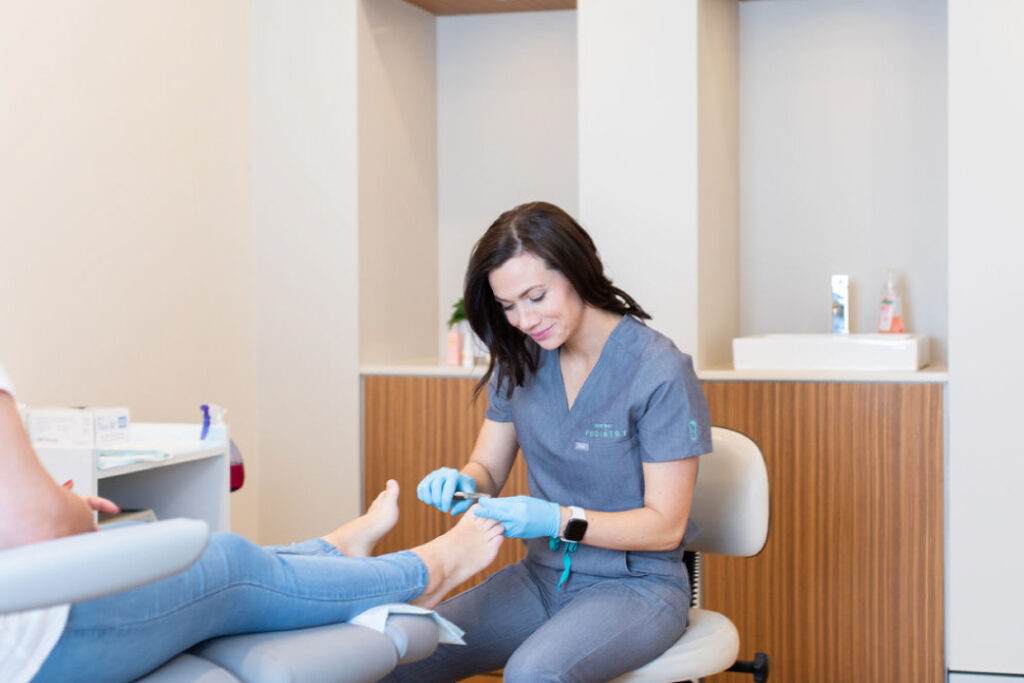INGROWN TOENAIL TREATMENTS
Ingrown toenails are a common complaint we see in both children and adults. There are a variety of treatments available depending on the cause of the pain and/or inflammation. Often there is a spike of nail that has pierced through the skin the requires removal before healing will begin. We are very experienced in doing this, and although it sound terrifyingly painful, if removed in the correct way is relatively pain free.
Other causes can be from picking at toenails or surrounding skin causing inflammation, or a very curved nail shape that causes pressure on the nail edges.
Normally for once off occurrences, after the case has been addressed the problem will not occur again.
For reoccurring ingrown toenails, nail surgery may be recommended as a long-term solution.



Comprehensive Ingrown Toenail Solutions at Rose Bay Podiatry
Ingrown toenails, while common, can cause significant discomfort and impact your daily activities. At Rose Bay Podiatry, we specialize in providing effective, minimally invasive treatments for ingrown toenails, ensuring you can walk comfortably and confidently. Understanding the causes and preventive measures can help you manage or avoid this painful condition. Here’s what you need to know about ingrown toenails and how Rose Bay Podiatry can help.
Understanding Ingrown Toenails
An ingrown toenail occurs when the edge of the toenail grows into the surrounding skin, leading to pain, redness, and swelling. Causes can vary from improper nail trimming, tight footwear, to genetic predisposition. Recognising the early signs of an ingrown toenail is crucial for preventing infection and more severe complications.
Preventing Ingrown Toenails
Prevention is key to avoiding the discomfort associated with ingrown toenails. Here are some tips to keep your toenails healthy:
- Proper Nail Trimming: Cut your toenails straight across, avoiding rounding the corners, to prevent the nail from growing into the skin.
- Appropriate Footwear: Wear shoes with a wide toe box that doesn’t compress your toes.
- Foot Hygiene: Maintain clean, dry feet to prevent bacterial or fungal growth.
Why Choose Rose Bay Podiatry for Ingrown Toenail Treatment
Expertise and Experience: Our podiatrists are highly skilled in diagnosing and treating ingrown toenails, employing the latest techniques for the best outcomes.
Personalised Treatment Plans: We understand that each case is unique. We offer tailored treatment plans, from conservative management to surgical options, based on your specific needs.
Minimally Invasive Options: We focus on minimally invasive treatments, ensuring a quick recovery and minimal discomfort.
Preventive Care Guidance: Beyond treating your current condition, we provide advice and strategies to prevent future occurrences of ingrown toenails.
Treatment Options at Rose Bay Podiatry
Conservative Management: Includes careful trimming of the ingrown portion of the nail, education on proper nail care, and advice on appropriate footwear.
Partial Nail Avulsion: A minor surgical procedure performed under local anaesthesia, removing the ingrown section of the nail to provide relief and prevent recurrence.
Phenolisation: An advanced treatment following partial nail avulsion that prevents the regrowth of the problematic section of the nail, offering a permanent solution to recurrent ingrown toenails.
Schedule Your Consultation Today
Don’t let ingrown toenails disrupt your life. Contact Rose Bay Podiatry to schedule a consultation. Our team is committed to providing you with the highest standard of care, from diagnosis to treatment and prevention of future ingrown toenails. With our expert care, you can step forward in comfort and confidence.
FAQs
Q: Is ingrown toenail treatment painful?
A: Our treatments are varied depending on the severity. However, we always maintain a gentle technique to ensure minimal discomfort. Any procedure that may involve discomfort can be performed with minimal discomfort thanks to local anaesthesia. Post-treatment pain is typically mild and manageable with over-the-counter pain relief.
Q: How long is the recovery after ingrown toenail treatment?
A: Recovery times vary depending on the treatment provided. Most patients resume normal activities within a few days, with complete healing often occurring within two to four weeks.
Q: Can ingrown toenails recur after treatment?
A: While treatment significantly reduces the risk of recurrence, following our preventive care guidance is crucial for lasting results. In cases of genetic predisposition, we discuss long-term management strategies to minimise recurrence risk.
